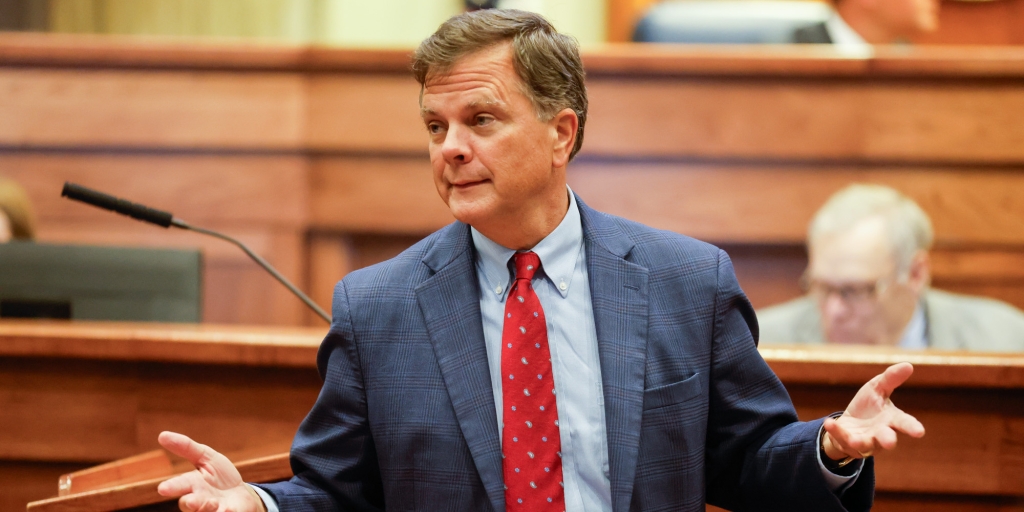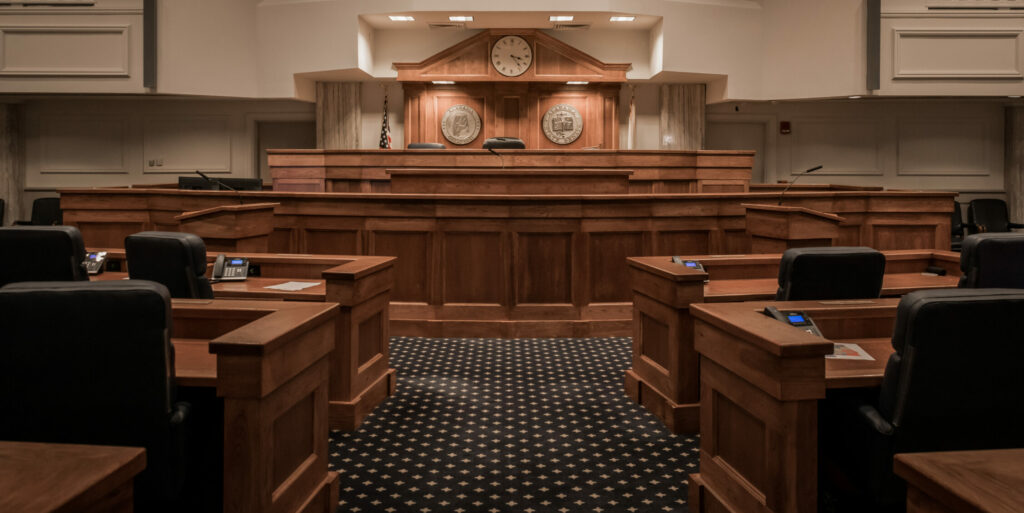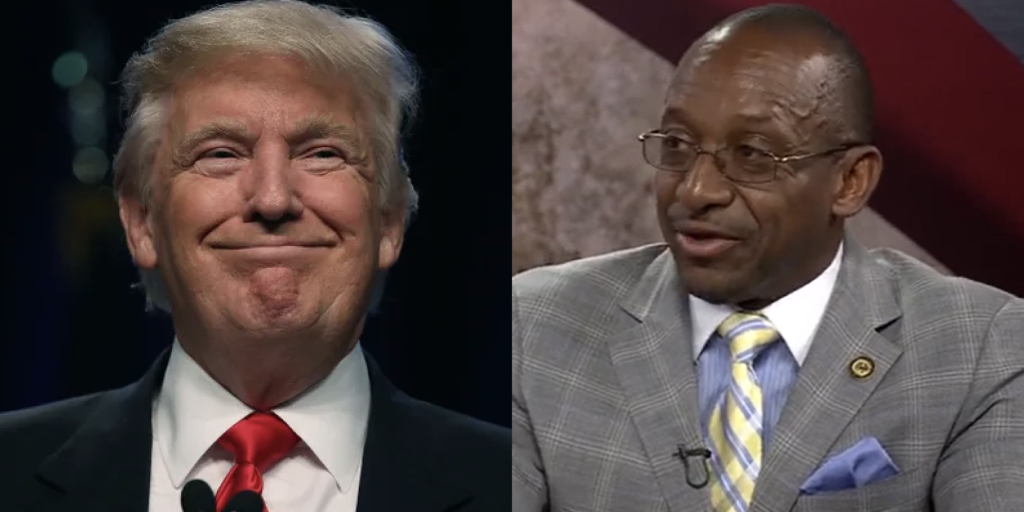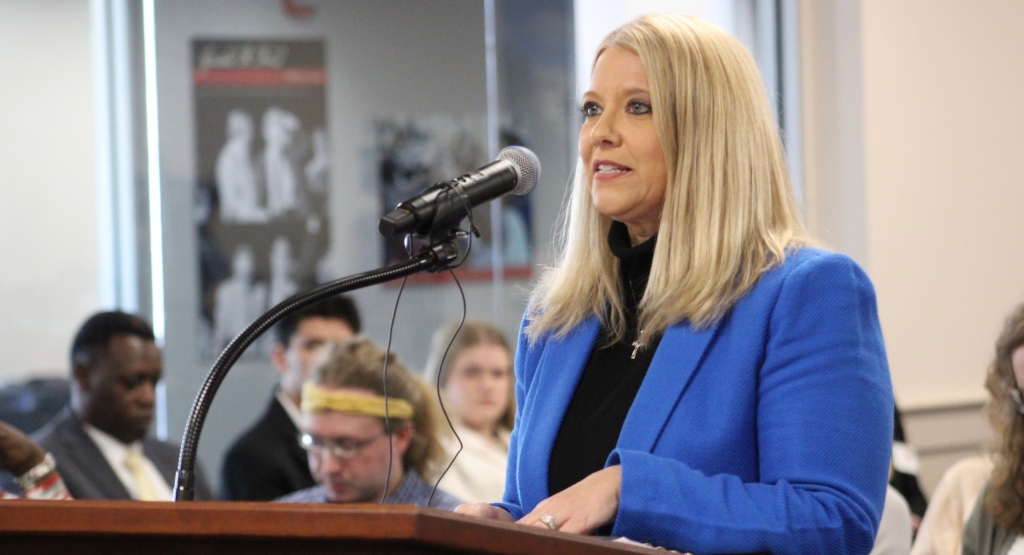MONTGOMERY — Fireworks flew during the Senate Committee on Education Policy’s meeting on Wednesday afternoon during debate of SB 12, which would mandate the playing of the national anthem at least once per week in public school classrooms and at most school sporting contests.
Sponsored by Senator Gerald Allen (R-Tuscaloosa), SB 12 — if passed by the legislature — would propose a constitutional amendment that would go before the people of Alabama in a referendum to occur in a subsequent general election.
Allen on Wednesday explained that the genesis of the bill is that during public school sporting events he has attended as a grandfather in Alabama over the past year, the anthem is not being played — much to his disappointment.
“This bill is about patriotism,” Allen previously advised in a statement. “It’s about reminding our students of the importance of our freedoms and the high price that has been paid to protect and preserve those freedoms.”
“It is important that we remember our nation’s history and learn from it,” he continued. “As President Ronald Regan said, ‘Freedom is never more than one generation away from extinction. It must be fought for, protected, and handed on for them to do the same.’”
Allen last spring introduced a similar bill, although that legislation would not have been a constitutional amendment. The 2020 bill was advanced by the Senate Committee on Education Policy but failed to move further in a session interrupted by the COVID-19 pandemic.
On Wednesday, an amendment was introduced during the committee meeting specifying that only a traditional rendition of the Star-Spangled Banner would satisfy SB 12’s requirements, rather than an “artistic” or “jazzed up” version, as committee chairman Senator Tim Melson (R-Florence) said.
However, Senators Rodger Smitherman (D-Birmingham) and Vivian Figures (D-Mobile) raised fervent opposition to the committee amendment and the bill itself.
They noted that the third verse of the Star-Spangled Banner references slavery.
“That those lyrics are a part of that song is the point,” Figures commented, with Smitherman affirming.
Melson and other Republicans on the committee said they were not familiar with those lyrics from the third verse, as only the first verse of the Star-Spangled Banner is normally referred to and played as the national anthem.
Smitherman reminisced that a former senator had “flaunted” that third verse in the past, to the offense of him and others. Smitherman said that past incident had led to the GOP Caucus disciplining that former member. “He was trying to say, in essence, that God had ordained slavery,” the Democrat from Birmingham said.
Figures then read the third verse aloud to the committee.
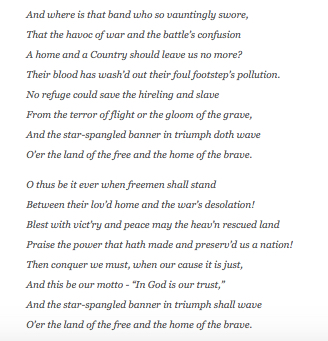
“Senator Allen, why is this necessary?” Figures asked following her recitation.
Melson, attempting to show willingness to address the concerns of the committee members, subsequently said, “I have no problem playing the non-lyrical ‘anthem.’ I’m going to show respect to my minority people here.”
Figures then expressed bemusement by that turn of phrase. It should be noted that Democrats are the minority caucus in the Senate and often referred to accordingly as minority members.
“Did that sound bad?” Melson asked.
“Yes,” answered Figures.
At this point, the wheels were beginning to come off the committee meeting, and Allen attempted to answer Figures’ previous question about his reasoning behind the bill.
“It’s the national anthem,” he subsequently stressed. “It’s one that I think can rally all Americans together.”
“And as long as I’ve been alive, I celebrated my 71st birthday Monday, and I have never heard the national anthem sung all the way through,” Allen continued, referring to the the aforementioned third verse. “Just the first verse, you know. I mean, it’s the national anthem. It should bring everyone together.”
Smitherman then rebutted that the main issue he has with SB 12 is making the national anthem mandatory, as certain communities in Alabama will not want to play it.
“I didn’t want to hear them playing this song last night before I had my ballgame at Ramsay High School,” he stated. “Nobody in Ramsay High School probably wanted to hear it. We played against Parker High School. Ok, now ‘why you saying all that?’ Parker High School and its whole area is ‘Dynamite Hill.’ From the bomb. See what I’m getting at? Sixteenth Avenue Baptist Church, the hose, the dogs. And we’re going to tell this team ‘you’ve got to play this?’ See, that’s what I’m trying to tell you. That’s like taking a pie and twisting it in their face.”
“If somebody wants to play [the anthem], that’s their business,” Smitherman added. “But to put it in statute to make it a law that they’ve got to play this, and knowing it’s offensive to them, that’s the utmost disrespect.”
Figures then came back around to what Melson had said a few minutes earlier.
“I do want you to not call us ‘your minority people’ ever again,” she emphasized.
“I didn’t say it like that,” Melson responded.
“We are minority members,” Figures said.
“Well, I apologize if that was offensive,” the chairman answered. “But I think Senator Smitherman knows me well enough to know that that’s not even close to anything I would have said to offend anybody.”
Melson subsequently asked Allen to sit down with Smitherman and Figures to work on a “compromise that makes it work.” Allen pledged to “sit down and listen to what they’ve got to say,” which drew chuckles from Smitherman and Figures.
Shortly afterwards, Smitherman, in impassioned remarks, cautioned his Republican colleagues — who are all white — against dismissing the Democrats’ concerns from a place of “privilege.”
“I hope that this disregard for how these things effect citizens in this state don’t put us in a situation that this becomes more important than all these other serious things that we’ve got to deal with in this body (during the session),” Smitherman warned. “I want to say that. Because the swiftness that [a motion to adopt the amendment] was made was like — ‘I don’t give a crap about what they think, OK, let’s get this bill out of here.’”
He continued to lament that “disrespect” was being shown to “a group of people that have been oppressed.”
“When you’re privileged, you don’t feel these things,” Smitherman added. “We ain’t privileged. We’re the ones that feel the brunt of all this stuff that we’re talking about, every day in our lives.”
Melson then tried to steer debate back to the committee amendment.
“So, what you’re really clarifying, senator, is that they don’t sing the black national anthem?” Figures said to Melson.
“No, ma’am,” he responded.
Figures subsequently clarified that she does not recognize the first verse of the Star-Spangled Banner as her national anthem.
“See, we have the black national anthem,” she added. “Which are different words.”
Melson then ordered the roll called on the amendment as Figures continued talking about the difference between the national anthem and the “black national anthem.”
“It’s not anything to undermine the ‘black national anthem,’” Melson reiterated about the committee amendment. “They can play that as well, after they play this one.”
The amendment was adopted with Smitherman and Figures dissenting. The bill was carried over.
Listen to audio of this committee debate here.
“You know I love you, Senator Melson. You know I love all of you,” Figures remarked later in the meeting when the room had cooled down.
Melson near the end of the meeting requested to talk to Figures and Smitherman privately following adjournment.
Sean Ross is the editor of Yellowhammer News. You can follow him on Twitter @sean_yhn







